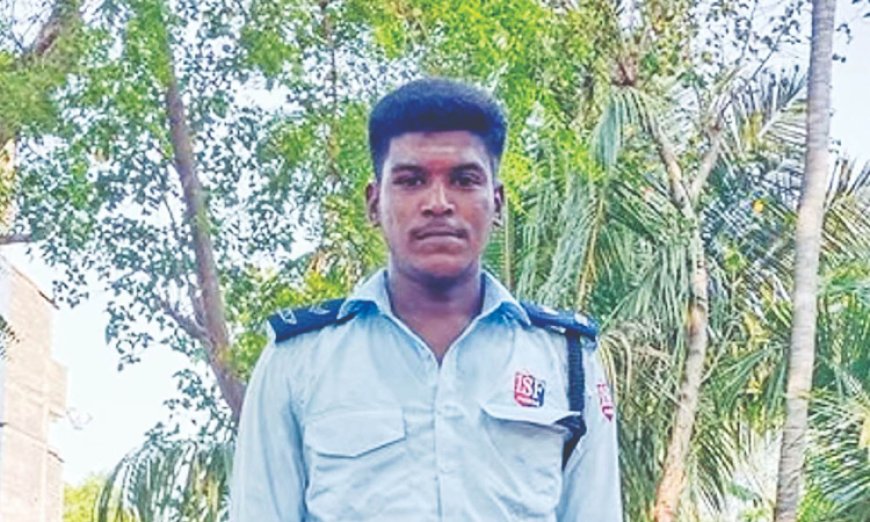Ajith Kumar Custodial Death: Tamil Nadu Grieves, Demands Justice
Ajith Kumar, a 28-year-old temple security guard, died in police custody in Tamil Nadu under suspicious circumstances. His death has sparked statewide protests, judicial intervention, and a CBI probe into alleged police torture.

SIVAGANGA, TAMIL NADU – July 2, 2025: The tragic custodial death of 28-year-old Ajith Kumar, a part-time security guard at the Madapuram Kaliamman Temple in Sivaganga district, has sparked widespread outrage across Tamil Nadu, highlighting deep concerns over police brutality and accountability.
Who Was Ajith Kumar?
Ajith Kumar was a resident of Okkur in Sivaganga district, working as a temporary security guard at the Madapuram temple, a popular pilgrimage site. Known to be quiet, sincere, and struggling to support his family, he had no known criminal record. He was reportedly epileptic and had been undergoing treatment.
The Incident
On June 27, a complaint was lodged about a theft from a devotee’s car parked near the temple. Based on suspicion, police summoned Ajith Kumar and his brother for questioning. They were allegedly taken to a nearby cow shelter, an unofficial location, where no CCTV surveillance exists. What unfolded there has since become the center of a storm.
According to eyewitness accounts and family statements, Ajith and his brother were subjected to extreme torture. His brother alleges they were tied up and beaten with iron rods and plastic pipes, one after another, by multiple officers in shifts. He claims the police continued to assault Ajith even after he began seizing and crying out.
Later, Ajith was found unconscious and was taken to the Government Rajaji Hospital in Madurai, where he was declared dead.
Autopsy Findings
The post-mortem report, conducted by a panel of doctors, reportedly revealed 18 external injuries, indicating severe physical trauma. Internal bleeding and evidence of blunt-force injuries raised serious doubts about the police narrative that Ajith suffered an “epileptic seizure” while trying to escape custody.
Family’s Stand
Ajith's family vehemently denies the police’s claims. They state that he was not a thief, and instead was made a scapegoat due to his position as a low-ranking, expendable worker. His mother and brother described his bruised, swollen body and demanded murder charges against the officers involved.
Judicial and Government Response
The Madras High Court’s Madurai Bench took immediate suo moto cognizance of the case and described the incident as "a state killing its own citizen." The court ordered a judicial inquiry led by the district judge of Sivaganga and called for the investigation to be conducted with the seriousness of a murder probe.
Chief Minister M.K. Stalin condemned the incident as "completely unjustified" and announced the transfer of the case to the Crime Branch-Criminal Investigation Department (CB-CID). He also removed the district Superintendent of Police, Ashish Rawat, from duty and reassigned senior officers to ensure neutrality in the probe.
As pressure from opposition parties and the public mounted, Stalin ordered a CBI probe, signaling the gravity of the case.
Police Action
Five policemen directly involved in the interrogation have been arrested and charged under multiple sections, including causing death in custody. Six others have been suspended, and further disciplinary proceedings are pending.
Political Fallout
The incident has created a major political stir in Tamil Nadu. Opposition parties, including the AIADMK, BJP, and CPI(M), have called for stronger action, including a murder charge, compensation to the family, and a state-level police accountability commission.
Actor-politician Vijay and several civil rights groups have demanded an independent Special Investigation Team (SIT), monitored by the High Court, to ensure transparency.
Public Reaction
On social media, the hashtag #JusticeForAjithKumar continues to trend, with citizens, activists, and politicians expressing anger over recurring custodial deaths in the state. Candlelight marches, protests, and petitions have emerged in several districts.
Why It Matters
Ajith Kumar’s death is not just an isolated tragedy—it adds to the growing list of custodial deaths in Tamil Nadu. Civil rights watchdogs have noted that over two dozen custodial deaths have occurred in the state over the last few years, raising questions about police training, accountability, and internal oversight.
The case is now a litmus test for the Tamil Nadu government’s willingness to act decisively against abuse of power within its own law enforcement machinery.
Conclusion
Ajith Kumar's death has pierced the conscience of the state. As the investigation unfolds, the people of Tamil Nadu await not just justice for one young man, but a commitment to reform and the assurance that such brutality will no longer be tolerated in a democratic society.











